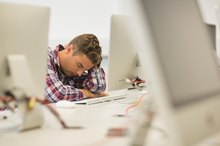Can Stopping Exercise Make Your Period Late?
Changes in your exercise patterns, including cessation of exercise, can cause fluctuations in your menstrual cycle. Although excessive exercise more commonly causes delayed or stopped periods, a lack of exercise could potentially be responsible for your period's lateness as well, especially if you have gained weight as a result. Sometimes a combination of factors including exercise cessation may cause a late period. Every woman is unique, and so is her cycle. If you have repeated missed periods, you should see your doctor.
Menstruation and Amenorrhea Facts
Women typically begin menstruating between the ages of 8 and 15, with an average onset of 12 years, and periods can be irregular in the beginning. Amenorrhea, the absence of mensturation, is diagnosed when a woman misses at least three consecutive periods. The reasons for missed periods vary greatly and may include pregnancy, lactation, menopause, certain medications, hormonal imbalances, and lifestyle factors such as excessive exercise and stress. Conditions that impact the reproductive system -- for example, polycystic ovary syndrome -- are also potential causes for delayed menstruation. Although it would be uncommon for exercise cessation to be the sole factor behind delayed periods, it could be a contributing factor.
- Women typically begin menstruating between the ages of 8 and 15, with an average onset of 12 years, and periods can be irregular in the beginning.
- The reasons for missed periods vary greatly and may include pregnancy, lactation, menopause, certain medications, hormonal imbalances, and lifestyle factors such as excessive exercise and stress.
Weight Gain After Stopping Exercise
Why Period Might Come One Week Early
Learn More
When you stop exercising, your body weight may change due to the lack of activity. If you consume the same number of calories after you stop working out, weight gain is often inevitable. When your body weight changes significantly in either direction, your menstrual cycle may be delayed. To delay menstruation, this weight gain would normally need to be significant enough to be classified as obesity, but every woman is unique, and thus any weight gain could conceivably cause or contribute to a late period.
- When you stop exercising, your body weight may change due to the lack of activity.
- If you consume the same number of calories after you stop working out, weight gain is often inevitable.
What You Can Do
If you are experiencing delayed menstruation and you suspect that your lack of exercise may have something to do with it, consider the other potential causes of late periods. Starting to exercise again, even at just a minimal level, can help regulate your body so that you could potentially resume a regular cycle. If you can control any of the factors, such as stress, that may be contributing to your delayed periods, you should do so. Reducing stress has benefits not just for menstrual cycle regularity but also for your mind and body.
- If you are experiencing delayed menstruation and you suspect that your lack of exercise may have something to do with it, consider the other potential causes of late periods.
- If you can control any of the factors, such as stress, that may be contributing to your delayed periods, you should do so.
When to Seek Help
Can Exercise or a Change in Diet Affect Your Period Even While on Birth Control?
Learn More
If you are experiencing any symptoms of illness or health irregularities along with your delayed period, you should consider seeking medical attention. The U.S. Department of Health and Human Services Office on Women's Health website states that you should see a doctor if your period stops for at least 90 days. Although the cessation of your period for an extended time does not necessarily indicate a serious health problem, it can be an indicator of health issues and warrants attention by medical professionals.
Related Articles
References
- The National Women's Health Education Center: Menstruation and the Menstrual Cycle
- Mayo Clinic: Amenorrhea Causes
- The National Women's Health Education Center: Polycystic Ovary Syndrome
- Bae J, Park S, Kwon JW. Factors associated with menstrual cycle irregularity and menopause. BMC Womens Health. 2018;18(1):36. doi:10.1186/s12905-018-0528-x
- Berz K, Mccambridge T. Amenorrhea in the female athlete: What to do and when to worry. Pediatr Ann. 2016;45(3):e97-e102. doi:10.3928/00904481-20160210-03
- Fourman LT, Fazeli PK. Neuroendocrine causes of amenorrhea--an update. J Clin Endocrinol Metab. 2015;100(3):812-24. doi:10.1210/jc.2014-3344
- Baker FC, Driver HS. Circadian rhythms, sleep, and the menstrual cycle. Sleep Med. 2007;8(6):613-22. doi:10.1016/j.sleep.2006.09.011
- Fourman LT, Fazeli PK. Neuroendocrine causes of amenorrhea--an update. J Clin Endocrinol Metab. 2015;100(3):812-24. doi:10.1210/jc.2014-3344
- Bae J, Park S, Kwon JW. Factors associated with menstrual cycle irregularity and menopause. BMC Womens Health. 2018;18(1):36. doi:10.1186/s12905-018-0528-x
- Rosenfield RL. Clinical review: Adolescent anovulation: maturational mechanisms and implications. J Clin Endocrinol Metab. 2013;98(9):3572-83. doi:10.1210/jc.2013-1770
- Santoro N. Perimenopause: From Research to Practice. J Womens Health (Larchmt). 2016;25(4):332-9. doi:10.1089/jwh.2015.5556
- Li C, Zhao WH, Meng CX, et al. Contraceptive use and the risk of ectopic pregnancy: A multi-center case-control study. PLoS ONE. 2014;9(12):e115031. doi:10.1371/journal.pone.0115031
- Klein DA, Poth MA. Amenorrhea: an approach to diagnosis and management. Am Fam Physician. 2013;87(11):781-8.
- Ackerman KE, Misra M. Amenorrhoea in adolescent female athletes. Lancet Child Adolesc Health. 2018;2(9):677-688. doi:10.1016/S2352-4642(18)30145-7
- Kriplani A, Goyal M, Kachhawa G, Mahey R, Kulshrestha V. Etiology and management of primary amenorrhoea: A study of 102 cases at tertiary centre. Taiwan J Obstet Gynecol. 2017;56(6):761-764. doi:10.1016/j.tjog.2017.10.010








